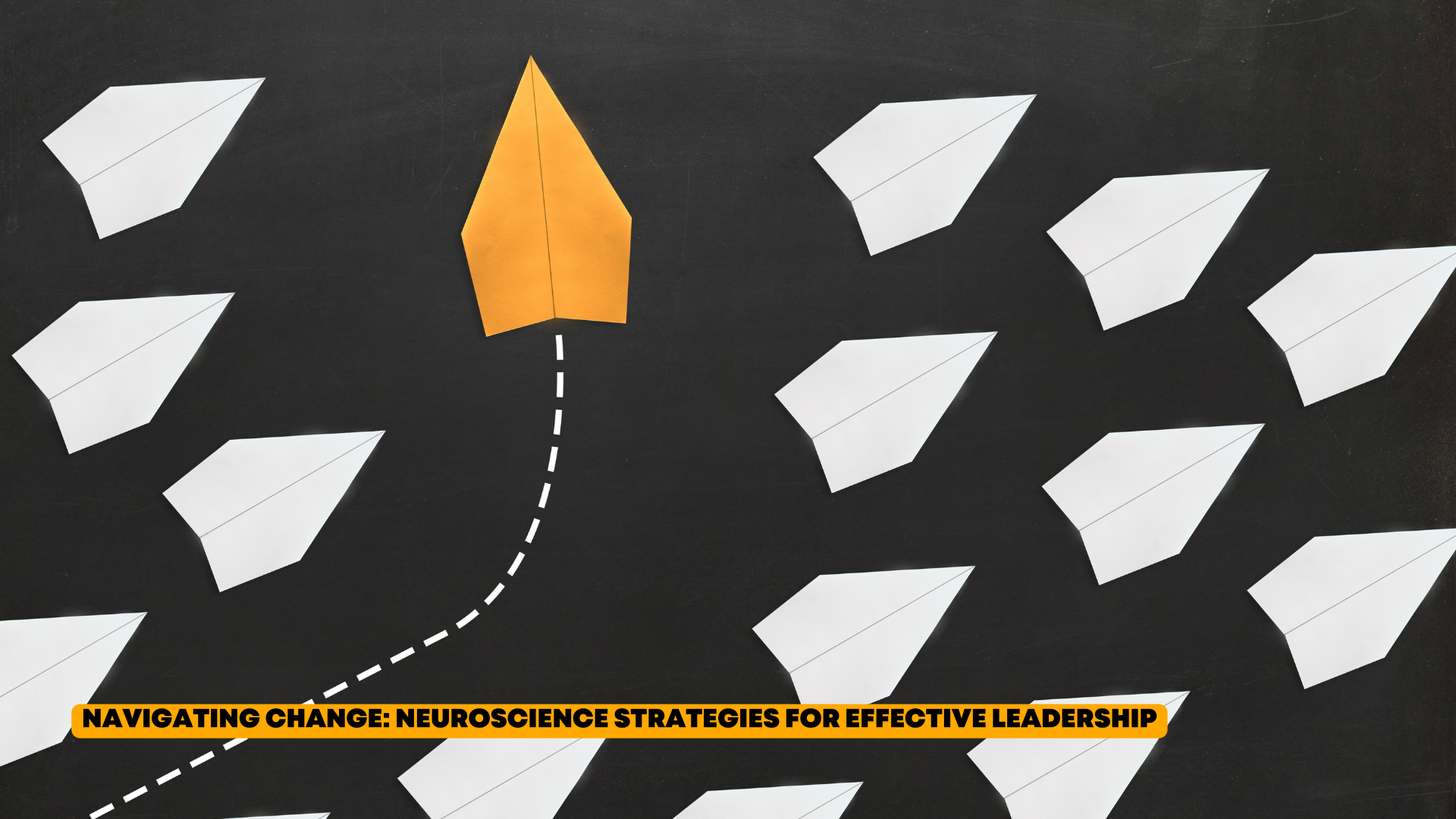Leadership Leverage: science-based Task Delegation
Think back to a time when your to-do list was overflowing, your mind racing with tasks yet to be done. In those moments, the art of delegation isn't just handy; it's a lifeline.
Neuroscience tells us that effective delegation goes deeper than task management. It's a dance of trust, chemistry, and understanding how our brains react to both giving and receiving responsibilities.
In this article, we'll dive into five key steps that will not only help you delegate like a pro but also understand the science behind why these strategies work. You'll learn not just to delegate, but to do so in a way that enhances your team's efficiency and morale. Let's get started on transforming your approach to leadership and teamwork, backed by a sprinkle of brain science magic.
Understanding the Neuroscience Behind Delegation
The first step in mastering delegation is grasping the brain science that underpins it. Delegation isn’t just a practical necessity; it's a psychological and neurological process that, when done right, can significantly benefit both you and your team.
Brain Chemistry and Trust
Delegating tasks involves a profound element of trust, which is deeply rooted in our brain's chemistry. When you delegate a task, you're essentially saying, "I trust you to handle this." This act triggers the release of oxytocin, a hormone associated with social bonding and trust. It's a two-way street: your trust in your team enhances their sense of responsibility and belonging, and their successful completion of tasks reinforces your trust in them.
Stress Reduction and Decision-Making
From a neurological standpoint, delegating can help reduce stress levels. The prefrontal cortex, the part of the brain responsible for decision-making and executive functions, can become overwhelmed when inundated with tasks. By delegating, you lighten your cognitive load, allowing your brain to function more effectively. This not only improves your decision-making capabilities but also reduces feelings of stress and burnout.
Enhanced Performance and Learning
Delegation also plays a key role in the development and performance of your team. When you assign tasks to team members, you're not just offloading work; you're providing them with an opportunity to learn and grow. This learning process is governed by the brain's neuroplasticity, its ability to reorganize itself by forming new neural connections.
Challenging tasks encourage your team members' brains to adapt and develop new skills, fostering a culture of continuous improvement and development.
Takeaway:
Recognize that delegation is a trust-building exercise that benefits both parties.
Use delegation as a tool to manage your cognitive load and stress levels.
View delegation as an opportunity for team development, leveraging the brain's ability to learn and adapt.
Identifying What to Delegate
The second step is pinpointing exactly which tasks to delegate. This decision isn't just about easing your workload; it's about strategically choosing tasks that enhance team dynamics and individual growth.
Task Impact and Complexity
Begin by evaluating the impact and complexity of each task. High-impact tasks that require specialized skills or deep knowledge might be best kept with you. On the other hand, tasks that are time-consuming but less complex are prime candidates for delegation. This process not only helps in effective workload management but also ensures that each task is handled by the person best suited for it.
Prioritizing for Delegation
Prioritization is key. Consider which tasks are urgent and important, and which can be efficiently handled by someone else. This is where your experience in business and finance comes into play. Just like allocating resources for maximum return, allocate tasks based on their potential to develop skills and contribute to overall goals.
Using Neuroscience to Guide Decisions
Neuroscience tells us that our brains are wired to seek efficiency. By delegating tasks, you're allowing your brain to focus on what it does best, leading to increased productivity and creativity. Additionally, delegating tasks that offer learning opportunities can boost dopamine levels in your team members, enhancing motivation and engagement.
Takeaway:
Assess tasks based on impact, complexity, and suitability for delegation.
Prioritize tasks strategically, keeping in mind both urgency and potential for team development.
Leverage neuroscience to create an environment where both you and your team can thrive by focusing on tasks that best suit your respective skills and growth potential.
Choosing the Right People
Now that you've identified what to delegate, the next crucial step is choosing the right people for these tasks. This isn't just about matching skills with tasks; it's about understanding your team's capabilities and potential from a neuroscience perspective.
Matching Skills and Strengths
Start by assessing the skills and strengths of your team members. The key here is to align tasks with the individual's capabilities and areas of expertise. This not only ensures that the task is completed efficiently but also gives the team members a sense of competence and achievement.
Understanding Brain Responses to Challenges
From a neuroscience angle, when people are given tasks that align with their strengths, it activates positive neural pathways associated with confidence and success. Conversely, when faced with tasks that are far beyond their current skill set, it can trigger stress responses. The ideal is to find that sweet spot – tasks that are challenging enough to be engaging, but not so difficult that they become overwhelming.
Developmental Needs and Potential
Consider the developmental needs of your team members. Delegating tasks that can help them grow and develop new skills is a powerful way to invest in their future. This approach taps into the brain's neuroplasticity – its ability to learn and adapt. By strategically delegating tasks that stretch their abilities, you're helping them forge new neural connections and become more versatile and skilled professionals.
Takeaway:
Match tasks with team members based on their skills, strengths, and areas for growth.
Use your understanding of neuroscience to delegate tasks that stimulate positive brain responses and avoid overwhelming stress.
Focus on the developmental potential of each task, aiming to challenge and grow your team's capabilities.
Communicating Effectively
Effective communication is the cornerstone of successful delegation. It's not just about telling someone what to do; it's about ensuring they understand the task, its importance, and their role in it. This is where your combined expertise in business and neuroscience really comes into play.
Clarity and Precision in Instructions
Start by being as clear and precise as possible in your instructions. Ensure that the objectives, expected outcomes, and any constraints or deadlines are communicated clearly. This reduces ambiguity, which can be a major source of stress and confusion.
The Neuroscience of Clear Communication
From a neurological perspective, clear communication helps in reducing the cognitive load on your team members. When instructions are clear, it's easier for the brain to process the information and focus on the task at hand. This clarity also helps in aligning the task with the individual's internal motivation systems, particularly their reward pathways, enhancing engagement and drive.
Creating a Feedback Loop
Effective delegation also involves creating a feedback loop. Encourage questions and discussions, and be open to receiving feedback. This two-way communication ensures that any misunderstandings are quickly addressed and that the team member feels supported and heard. Neuroscience shows us that such positive interactions can enhance trust and cooperation, stimulating the release of oxytocin, which in turn fosters bonding and improves teamwork.
Takeaway:
Be clear and precise in your instructions, outlining objectives, expectations, and deadlines.
Leverage neuroscience by reducing cognitive load through clear communication, aligning tasks with reward systems in the brain.
Establish a feedback loop to address misunderstandings, encourage questions, and foster a supportive environment.
Providing Support and Feedback
The final step in mastering the art of delegation is providing ongoing support and constructive feedback. This is crucial not just for the success of the delegated tasks, but for fostering a learning and growth environment within your team.
Support Through Availability and Resources
Make yourself available to your team members for guidance and support. Ensure they have the necessary resources and information to successfully complete their tasks. This support reinforces your trust in them and their confidence in handling the responsibilities.
Feedback and the Brain's Learning Process
Feedback plays a critical role in the brain's learning process. When you provide constructive feedback, it helps team members understand what they're doing well and where they can improve. This process engages the brain's reward system, particularly when feedback is positive, and activates neural pathways involved in learning and memory when identifying areas for improvement.
Creating a Culture of Continuous Improvement
Encourage an environment where feedback is seen as a tool for growth and development, not as criticism. This approach aligns with the brain's preference for positive reinforcement and helps in creating a culture of continuous improvement. Regular feedback sessions also help in recalibrating tasks and goals as needed, ensuring that both the team member and the task are on the right track.
Takeaway:
Be proactive in offering support and ensure access to necessary resources.
Use feedback as a tool for positive reinforcement and continuous learning, tapping into the brain's reward and learning systems.
Cultivate a culture where feedback is welcomed and valued, focusing on growth and improvement.
Effective delegation leverages both the science of management and the art of human psychology. It's about understanding the neuroscience behind trust and learning, recognizing what to delegate, choosing the right people, communicating clearly, and providing supportive feedback.
When you integrate these elements, you create an environment where trust flourishes, stress is minimized, and both you and your team can thrive.
As you implement these strategies, observe the transformation not just in your productivity, but in the dynamics of your team. You'll see increased confidence, improved performance, and a culture of continuous growth and development. Delegation, when done right, isn't just a task management tool; it's a catalyst for team empowerment and success.
















Most recognition programs miss the mark because they lack what truly drives motivation: frequent, specific feedback that taps into the brain’s dopamine-feedback loop. This article dives into how dopamine-driven feedback creates lasting motivation, transforming your recognition program from routine to truly impactful.